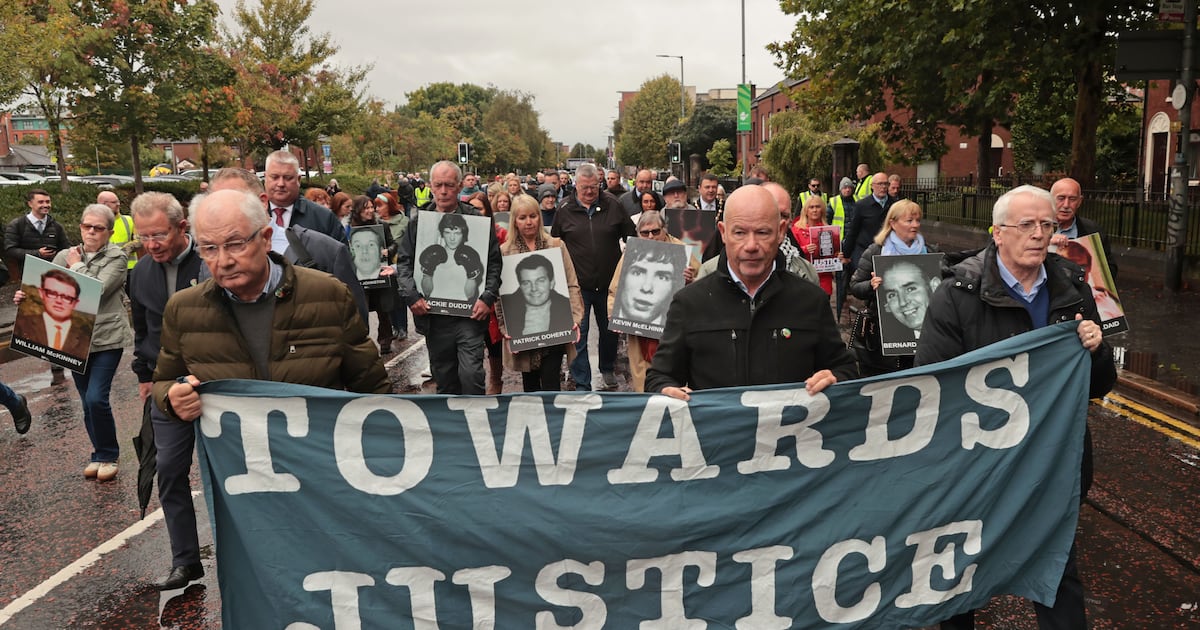A British army veteran will stand trial on Monday charged with murder in relation to Bloody Sunday, when the Parachute Regiment shot dead 13 civil rights protesters in Derry in 1972.
The former paratrooper, known as Soldier F, is charged at Belfast Crown Court with two murders and five attempted murders during a military operation that became a defining event of Northern Ireland’s Troubles.
He has pleaded not guilty to the murders of James Wray and William McKinney and the attempted murder of five others.
Soldiers shot 31 civilians in Derry’s Bogside on January 30th, 1972. Thirteen people died that day. Another casualty who died four months later is widely considered a 14th victim.
A tribunal led by Lord Widgery in 1972 cleared the soldiers of wrongdoing but a 2010 inquiry by Lord Saville concluded that the killings were “unjustified and unjustifiable”.
The British government apologised for the killings.
A court order granted Soldier F anonymity after defence lawyers argued he would be a “prized target” for dissident republicans if his identity was made public.
When he appeared in court for arraignment in December 2024, he sat in a witness box that was shielded from the main body of the court by a thick floor-to-ceiling blue curtain. Similar arrangements are expected for the trial.
Mr Justice Fowler will preside over the case without a jury, which is permitted in exceptional cases.
Relatives of William McKinney and James Wray were joined by a crowd of supporters as they walked to court on Monday morning.
A short rally was held outside the court buildings.
John McKinney, a brother of William McKinney, told those gathered: “Today marks a momentous day in our battle to secure justice for our loved ones who were murdered on Bloody Sunday. It has taken 53 years to get to this point, and we have battled all the odds to get here,” he said.
“Everything that we have achieved to this point has been through relentless commitment and a refusal to lie down. We will shortly occupy a courtroom very proudly with our heads held high and in the knowledge that, regardless of the ultimate outcome, that we are on the right side of history.
“A matter of a few metres away from us in the courtroom will sit Soldier F, cowering behind a curtain, waiting to go on trial for two counts of murder and five counts of attempted murder.”
At a pre-trial hearing in March, Soldier F’s legal team argued that inconsistencies in accounts by his fellow paratroopers and civilian witnesses meant there was insufficient evidence for a trial.
Prosecutors said “contestable evidence” would be addressed during the trial and that there was “overwhelming evidence” regarding Soldier F’s actions on the day the army opened fire on protesters in Derry’s Bogside.
Authorising the case to proceed, Mr Justice Fowler said he accepted evidence that indicated that soldiers in Glenfada Park acted unlawfully in firing with high-velocity rifles at a group of unarmed civilians in a relatively confined courtyard.
“In my view, it provides a sufficiency of evidence and it is not tenuous. Accordingly, the court discerns that the committal papers disclose a case sufficient to put the defendant on trial in respect of each of the seven counts on the indictment,” he said.
The case will be closely watched by families of those who died on Bloody Sunday and veterans’ groups, as well as the Irish and British governments.
London and Dublin are discussing ways to repeal the Legacy Act, which was an attempt by the previous Conservative government to phase out prosecutions for Troubles-era alleged crimes. – Guardian
